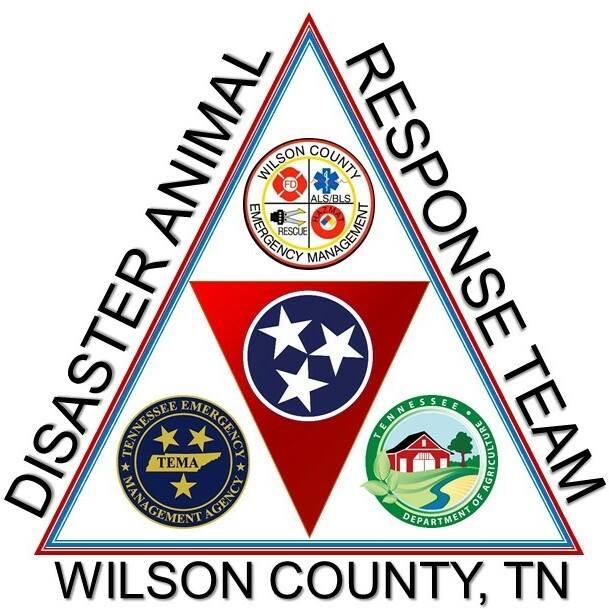Written by: Rachel Holly
When disaster strikes, the public’s first thoughts often go to the human victims, but animals are frequently forgotten or overlooked in the chaos. Whether it’s pets trapped in flooded homes, livestock stranded by wildfires, or wildlife displaced by storms, animals are among the most vulnerable victims of natural disasters. That’s where animal disaster response teams come in—heroes behind the scenes, dedicated to rescuing, sheltering, and caring for animals in the aftermath of crises. June, being National Pet Preparedness Month, serves as the perfect time to introduce you to a local disaster response group that’s always ready to step in when the need arises, proving that compassion for animals knows no bounds.

The Wilson County Disaster Animal Response Team is a an all-volunteer organization under the Wilson Co. Emergency Management Agency. Throughout its 18 years, WCDART has responded to flooding and tornado disasters in Macon Co, TN and the horrible wildfires of Gatlinburg in 2016. Their work attracted the attention of the Humane Society of The US when it requested WCDART’s assistance after Hurricane Harvey in Rockport, TX. In addition to natural disasters, WCDART has responded to other various situations where animals were in critical need of rescue both individually and in groups.
Everyone in Middle TN needs to know what amazing work this group of volunteers does for the four-legged victims of disasters. We had a great chat with Adrienne Molteni of WCDART and found out all about the critical work they do.
MTP: Tell us more about WCDART. When and how did it start? What is its mission?
Adrienne: WCDART was founded in 2007 after Hurricane Katrina displaced many pets and their owners. This natural disaster demonstrated the need for disaster preparedness in Wilson Co, so our founder, Julie Hutchison started our group.
Our mission is to provide temporary housing and care for all animals displaced by disasters, including those running at large. Our top priority is ensuring the safety and well being of those animals in our care.
We do our best as a Disaster Response Team to return animals to a healthy safe home or re-home them when that can’t be done.
MTP: You are an all-volunteer organization. How big is your team and what training does your team undergo?
Adrienne: Our team varies in number, but we have a core base of about 25 members. Our training varies from fear-free animal care/handling & sheltering to nutrition, animal & human first aid, SAR, CERT, shelter setup and field deployment.
MTP: What areas do you serve?
Adrienne: Wilson County primarily, but credentialed members can deploy anywhere outside the county.
MTP: What does an emergency response entail in terms of what resources and groundwork are necessary to provide the best assistance in a disaster situation?
Adrienne: For shelter set up we plan based on the numbers (that vary) and animals involved. We use our AKC trailer with crates and supplies for shelter set up/management. For disasters in the field we use our own equipment (carry in/carry out) and do our best to secure animals at large and reunite them with their owners and re-home.
MTP: Tell us about some of your rescues. What is your most memorable experience?
The most memorable was a horse that jumped the wall divider in a horse trailer and became very stuck- a terrible situation for the horse.
MTP: What was your most challenging rescue?
Adrienne: Our most challenging rescue was when approximately 100 meat-grade turkeys were being transported via two 18 wheeler trucks and one truck overturned. We carried 90% of them from the truck into the Davidson Co shelter for care then reloaded them into another truck ( poor turkeys were severally overweight and injured.)
Our most rewarding rescue was rescuing a 300lb pig from a sinkhole.
MTP: Describe a typical day on a rescue mission.
Adrienne: There are no typical days as the disaster situation is seldom the same. First, we receive a call from our WEMA team describing the situation, we assemble our team, and determine the supplies needed. We have a fully equipped enclosed trailer, so we develop our plan and deploy. If we are assisting another group, we work in support but if we are the primary team, we have a situation manager with our team that runs the deployment.
MTP: Do you have any upcoming events or fundraisers in the works?
May 17th Dog Wash @TSC Lebanon from 10:00-2pm
June 21st Dog Wash @ TSC Lebanon from 10:00-2pm
Aug 16th Dog Was @ TSC Lebanon from 10:00-2pm
Nov 15th Photos with Santa
MTP: How do you get the word out about WCDART?
Adrienne: Through word of mouth, social media, attending local events and fundraisers, and working with WEMA. We also work to educate the community.
MTP: How can people volunteer or donate to support your group?
Adrienne: People can reach out to me directly, call WEMA for our info, get in contact via to our facebook or instagram pages, our website, or call via google voice. We take most all donations and have a tax letter for filing purposes.
If you would like to learn more about WCDART, volunteer, or donate, check them out at:
facebook.com/WilsonTNEMADART
For more information about their training program for volunteers visit: https://wcdart.org/volunteer/
Plus, find out what you need to keep yourself and your pets safe in the event of a natural disaster, take a look at WDART’s Go Kits List.